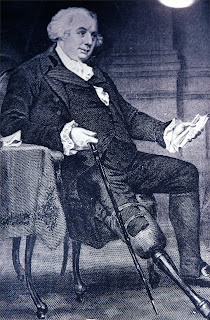The Articles of Confederation proved barely adequate during the
imperative of war and a failure after independence was achieved. A few years
after the Paris Peace Treaty, our military had been reduced to near extinction,
depression and inflation sapped hope, insurrection sprang from civil injustice,
and a confused government tottered
perilously close to collapse. European powers hovered like vultures, eager to
devour the remains.
It looked as if the American experiment was doomed. Then in May of
1787, delegates came to Philadelphia with a congressional charter to revise the
Articles of Confederation. They didn’t revise the Articles. Instead, they wrote
a constitution from scratch for a totally new government. These men carried out
a bloodless coup that replaced an existing government without a shot.
Who were these men? Who wrote the Constitution of the United
States?
 |
| Gouverneur Morris |
The short answer is that Gouverneur
Morris wrote the Constitution, with editing help from other members of the
Committee of Style. In truth, all of the delegates, to a greater or lesser
degree influenced the substance of the Constitution. There were fifty-five
men that attended the Federal Convention, what we now call the Constitutional
Convention. When Thomas Jefferson read the list of attendees, he called them an
“assembly of demi-gods.”
Not exactly, but they were staunch revolutionaries and patriots.
They were also highly successful, well educated, and unswerving in their support
of the republican form of government. They came to Philadelphia committed to
rescuing American from its slide into
anarchy.
A few are household names. George Washington presided over the
convention. James Madison, Roger Sherman, Benjamin Franklin, Alexander
Hamilton, James Wilson, and George Mason were all key delegates. Many of the
rest have been forgotten.
Most of these men knew each other from years of politicking or
war. Twenty-nine served in a military capacity during the Revolution and
another twenty-three risked their fortunes and lives by taking an active political role during the war. Eight committed
treason by signing the Declaration of Independence.
In colonial America, college degrees were rare, yet twenty-nine
held college degrees and many others were self-educated in the classics and
modern political thought. Almost all of the delegates were knowledgeable about Aristotle,
Locke, Hume, and Montesquieu. Ten had degrees from the College of New Jersey
(later to become Princeton), six from European universities, four from Harvard,
four from Yale, four from William and Mary, two from the College of
Philadelphia, and one from Kings College (later to become Columbia University).
Forty-five delegates were rich. Thirty-one had the good fortune of
being born to wealthy or prominent families. Twelve were self-made and two
married into money. Ten struggled to make ends meet and to support their
families.
Eight were born in other counties and many were second generation
Americans. Eleven were businessmen, eight owned large plantations, three were
physicians, one was a professor, and six could be called professional
politicians.
Thirty of the delegates were lawyers in an age that revered the
rule of law and reason. All of them had extensive political experience and many
went on to take substantial roles in the government they created. Two became
president, twenty-five served in Congress, five gained appointments to the Supreme
Court, four became foreign ministers, and four held cabinet positions.
Not every delegate went on to further success. Six wealthy
delegates died impoverished, fleeing creditors. One was indicted, but not
tried, for treason. One barely escaped impeachment from the Supreme Court and
another was expelled from the Senate. Two died in duels, another mysteriously
disappeared in the middle of New York City, and another was rumored murdered by
a grandnephew impatient for his inheritance.
These were not demi-gods,
but real men with human frailties and weaknesses. They were honorable men—in
a day when honor defined a man. They sequestered themselves for four months in
a hot, closed room and argued endlessly over every detail of the government
plan. They often talked about future generations. They insisted on liberty for
themselves, but also wanted a system that would be safe for generations to come.
That long ago summer was truly amazing. Many question whether the
Founders understood the full ramifications of what they were doing. Read James Madison’s minutes. They knew. They set their sights incredibly
high. They understood that they were doing something big, really big.
Now it is our responsibility to remain worthy of their legacy.
How? First read this precedent shattering document—the
UnitedStates Constitution. Next, study the debates, the Federalist Papers, the Anti-Federalist
Papers,
and ratification conventions. You’ll be astounded how
an entire nation applied its collective intellect to design and approve a
system of checks and balances to preclude the dangerous concentration of power
in a few hands. Our Founding Fathers understood that liberty could not survive
centralized political power. The men who wrote the Constitution really believed that power tends to corrupt, and absolute power corrupts absolutely.
No comments:
Post a Comment